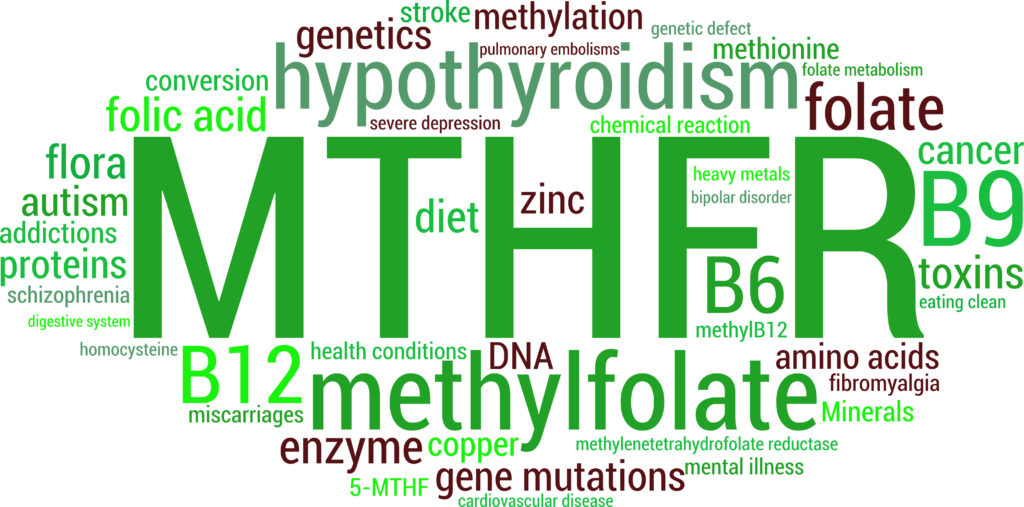4 Unique Facts About MTHFR Gene Mutations
Article at a Glance
- A meta-analysis of multiple studies looking at the link between MTHFR mutations and colorectal cancer has provided evidence that the TT genotype at C677T confers ~12% protection against this type of cancer, and a combination of this genotype with the CC genotype at A1298C provided an additional reduction of risk.
Genes Mentioned

Contents
Note: the research for this post was supplied by our science team.
Let’s talk about the good and bad of the MTHFR mutations affecting folate metabolism.
Folate and its metabolites are key in multiple biological processes, including DNA methylation. Elevated homocysteine is one of the hallmarks of impaired folate metabolism. One of the common genetic impairments of the folate cycle stems from a reduced function of an enzyme in this cycle known as methylenetetrahydrofolate reductase, which is encoded by the MTHFR gene.
Two common variants in the MTHFR gene are known to significantly affect its activity:
- rs1801133 (also known as C677T)
- and rs13801131 (also known as A1298C)
Both of these variants are in the coding region of the MTHFR gene, meaning that they modify the amino-acid composition of the enzyme. Each variant has an incidence of 20-30% in most populations, but C677T is much more prevalent in Ashkenazi Jews (~45%). The two variants are only mildly linked with each other, meaning that people will often have different combinations of these two mutations.
#1. Don’t worry about MTHFR “symptoms”
A heterozygous (CT) genotype at C677T results in the loss of approximately a third of MTHFR activity. The enzyme activity in people with the homozygous TT genotype of this variant retains only ~30% of the normal activity. For A1298C, the effect is milder, with ~60% normal MTHFR activity retained in people with the homozygous minor allele (CC). (R) Having both mutations likely results in a “double-hit” phenotype with an even less active enzyme, but standing alone will not result in symptoms.
#2. Methylation goes beyond just MTHFR genes
To account for the different effects that these two mutations have on the enzyme’s activity, we have assigned them different weights to calculate the total folate score. (Note that typically, we use these scores for something else: to reflect the strength of scientific evidence). That is how we handle the MTHFR scoring in our algorithms. For our methylation panel, MTHFR is just one gene out of several we evaluate, including:
- AHCY
- DPEP1
- MTR
- MTRR
- CBS
Mutations in the MTHFR gene are striking because they are both potentially harmful and common. This is unusual because mutations with strong effects are often selected against and are therefore quite rare. It has been hypothesized that there may be an evolutionary tradeoff between the ‘good’ and ‘bad’ effects of these mutations, which sounds plausible particularly because its distribution varies quite a lot depending on the population. The most obvious ‘bad’ effect of this mutation is the increased risk of excessive homocysteine [R, R, R]. This, in turn, can lead to a plethora of disorders from pregnancy defects to cardiovascular and neurological disorders [R, R].
#3. MTHFR mutations are protective against some cancers
But there are also ‘good’ effects of reduced MTHFR activity, such as reduced incidence of some cancers.
For example, a meta-analysis of multiple studies looking at the link between MTHFR mutations and colorectal cancer has provided evidence that the TT genotype at C677T confers ~12% protection against this type of cancer, and a combination of this genotype with the CC genotype at A1298C provided an additional reduction of risk [R]. The protective effects of these mutations against digestive system cancers have also been shown independently by a very recent study not included in this meta-analysis [R].
On the flip side, there is some evidence that these mutations may increase breast cancer risk, although it is less conclusive [R]. Importantly, the risk of excessive homocysteine in people with these mutations is much reduced where there is sufficient folate [R, R]. Therefore, living in environments where folate deficiency is less of a concern may make an evolutionary case for having less active MTHFR – for example, to reduce the risk of digestive system cancer, but also potentially for other reasons. This may include the ability to better preserve unmetabolized folate [R].
#4. Sunlight exposure impacts folate levels
It was long thought that the main factor affecting the incidence of MTHFR mutations is folate availability in the diet [R]. However, there is evidence that another factor could also be at play, at least for the Eurasian population and the C677T mutation. It was found that ultraviolet exposure, particularly to the more harmful UV-B, is the strongest environmental correlate of the reduced-activity genotypes CT and TT [R]. This incidence is markedly higher in areas with moderate UV-B levels than in areas with a lot of UV-B exposure. This makes sense since UV exposure is known to reduce folate levels in the blood [R].
Takeaways
What are the practical takeaways of these studies?
- First, do ensure you have sufficient folate if you have MTHFR mutations (and an elevated folate score in our analysis).
- You can consider supplementing 5-MTHF, which bypasses the MTHFR step altogether – but we advise working with a physician due to the prevalence of side effects.
- But also, if you have these mutations, it’s not all doom and gloom: adequate folate supplementation should protect you from most negative effects, while you may still benefit from their positive impacts, such as reduced incidence of digestive system cancers.




0 Comments
Leave Comment